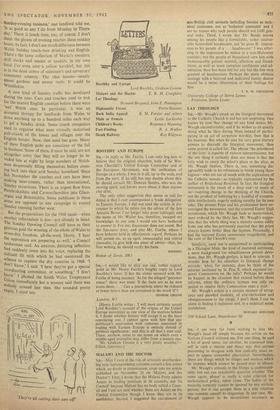LAY THEOLOGY
SIR,—Mr. Waugh's attack on the liturgical movement in the Catholic Church is sad but not surprising. One knows by now that change of any kind makes Mr. Waugh uncomfortable, and if he wishes to sit quietly doing what he likes during Mass instead of partici- pating in an act of corporate worship, then that is his business. But when he uses his very great literary powers to discredit the liturgical movement, then some protest is called for. The phrase `the priesthood of the laity' is capable of various interpretations; but the one thing it certainly does not mean is that the laity wish to usurp the priest's place at the altar, as Mr. Waugh implies. There is, too, something dis- agreeably snide in his references to brash young theo- logians—who are out of touch with the aspirations of the Catholic masses—so typically represented by the author of Brideshead Revisited. In fact, the liturgical movement is the result of a deep and—to many of us—inspiring change in the thinking of the Church, not the product of lobbying by a handful of irrespon- sible intellectuals, eagerly seeking novelty for its own sake. The present Pope and his predecessor have en- couraged the movement, and the restored Easter Vigil ceremonies, which Mr. Waugh finds so inconvenient, were ordered by the Holy See. Mr. Waugh's sugges- tion that the whole thing was a mistake comes oddly from one who has previously asserted that the priest always knows better than the layman. Personally, I find the restored Easter ceremonies magnificent, and the core of the Church's year.
Similarly, once one is accustomed to participating in a Dialogue MaSs, the kind of muttered ceremony, a mere background for miscellaneous private devo- tions, that Mr. Waugh prefers, is hard to tolerate. I wonder how far his objection to liturgical change extends: what, for instance, does he think of the reforms instituted by St. Pius X, which enjoined fre- quent Communion on the laity? Perhaps he would be happier in the situation that existed before those reforms, when the ordinary layman was only ex- pected to receive Holy Communion once a year.
Mr. Waugh's article is a curious mixture of arrog- 'ance and paraded modesty, of anti-clericalism and obsequiousness to the clergy. I don't think I can be alone in finding it malicious and. in a technical sense, scandalous.






































 Previous page
Previous page